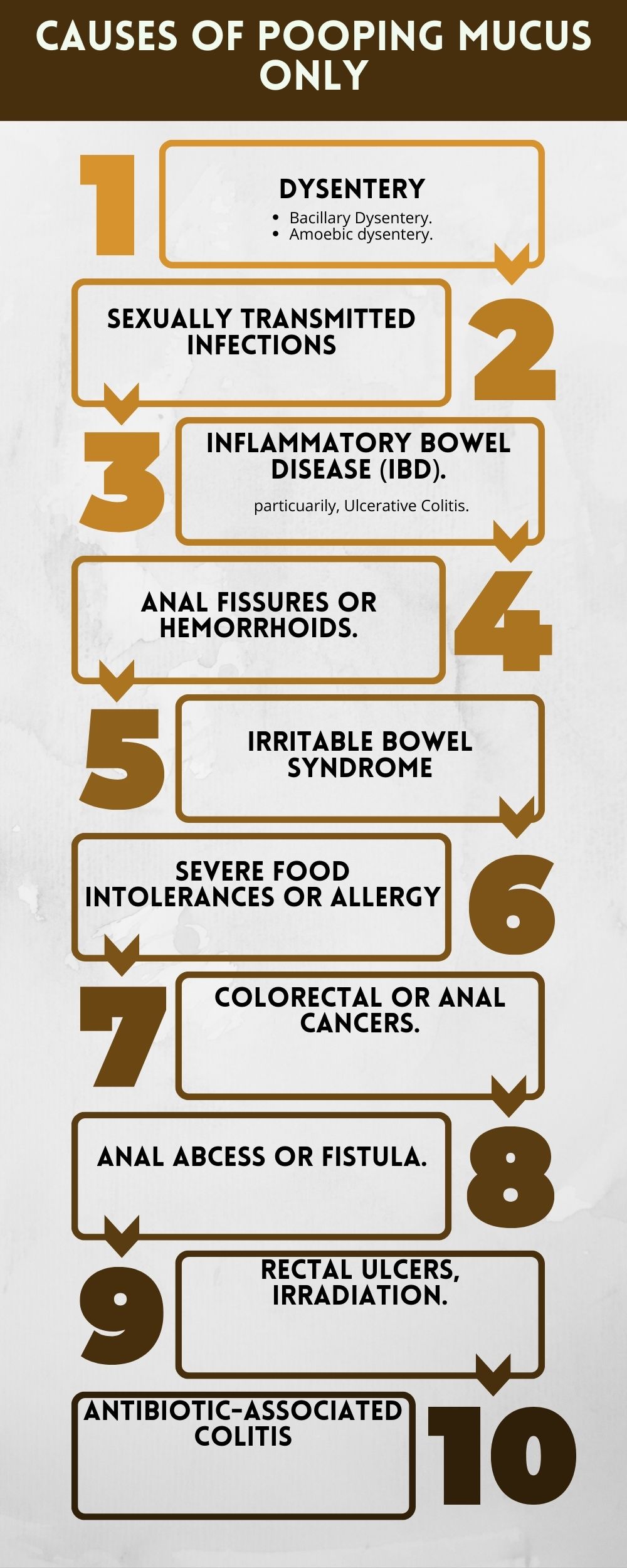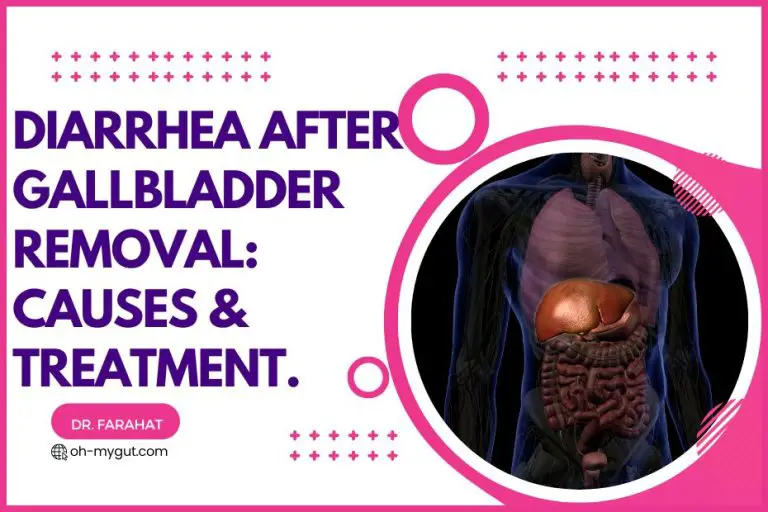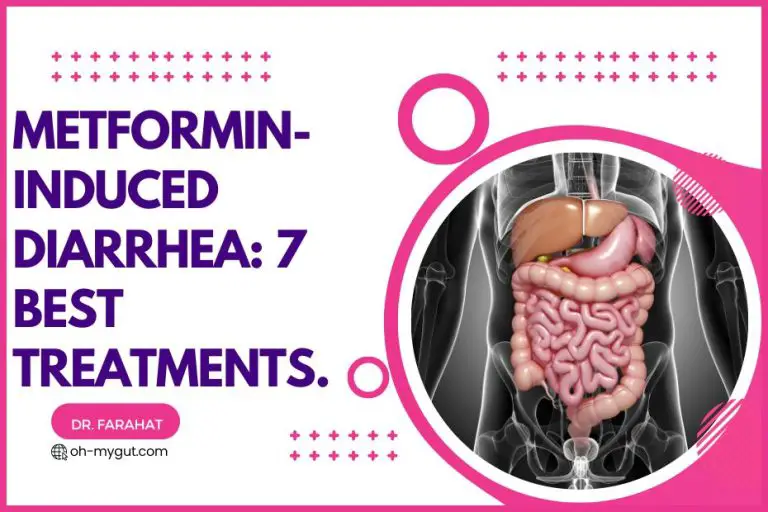Pooping Mucus Only: 12 Causes (GI Doctor Explains).
Our content is not intended nor recommended as a substitute for medical advice by your doctor. Use for informational purposes only.
A sudden change in bowel movements can be disconcerting, particularly when it involves the exclusive expulsion of mucus.
This unusual symptom often signals an underlying health issue.
In this article, we delve into the potential causes and effective treatments for this condition, providing a comprehensive guide to help you understand and manage this unsettling health scenario.
What you need to Know about pooping mucus only:
Usually, pooping mucus only is typically a sign of severe inflammation or infection of the colon or rectum. Common causes include dysentery, sexually-transmitted infections of the anorectal canal, inflammatory bowel diseases, anorectal fissures, or inflamed hemorrhoids.
Common causes of mucus-only stools include:
- Bacillary dysentery: is more likely to cause mucus-only poops than other causes of dysentery
- Sexually-transmitted infections (STIs) of the Anorectal canal are also a common cause of mucus in stool.
- Inflammatory bowel disease: Crohn’s and ulcerative colitis.
- An inflamed anal fissure or hemorrhoids.
- Irritable bowel syndrome.
- Rectal ulcers.
- anorectal abscess/fistulas.
- Antibiotic-associated colitis.
- Food intolerances.
- Anorectal cancers.
- Radiation colitis, proctitis.
- Diversion colitis.

1. Bacillary dysentery.
Amoebic dysentery is usually milder than bacillary dysentery. It is less likely to cause mucus, only poop, but it happens with severe forms of the disease.
Symptoms suggest bacillary dysentery.
- The onset is acute; dysentery is unlikely if you have recurrent mucus poop.
- Intense abdominal pain, especially in the lower abdomen.
- Diarrhea is associated with mucus and blood.
- In severe cases, mucus-only stools. Mucus and blood can come out without feces.
- Tenesmus: intense urgency to poop, but only mucus or a small amount of poop comes out.
- Fever: usually high grade.
- nausea or vomiting (rarely present with bacillary dysentery).
Bacillary dysentery symptoms can range from mild diarrhea to intense dysentery, blood or mucous stools, and high-grade fever.
Mild symptoms are usually self-limiting, but severe forms of the disease (such as mucus-only poop) require you to seek medical help.
2. Amoebic dysentery.
Entamoeba Histolytica is a common protozoan that can cause dysentery with blood and mucus in stool.
Amoebic dysentery is usually milder than bacillary dysentery. It is less likely to cause mucus only poop, but it happens with severe forms of the disease.
Symptoms of amoebic dysentery are similar to bacilliary dysentery; the main differences are:
- The onset is more gradual (usually over one to three weeks), and the severity is less than bacillary dysentery.
- can range from mild diarrhea to severe dysentery with mucus and blood in the stool.
- abdominal pain and fever are milder.
- Tenesmus is moderate.
- The stool is usually more formed and bulky, and blood and mucus are usually mixed with feces (with bacillary dysentery, blood, and mucus come out without feces).
- In severe cases, Entamoeba organisms can invade the colon’s wall, cause intestinal perforation, and cause fulminant inflammation of the colon.
The video below explains dysentery simply:
3. Other infections and food poisoning (foodborne illnesses).
Various infections, particularly bacterial ones, can infect your colon and rectal canal, resulting in mucus-only stool. Food poisoning occurs when a bacteria or its toxin infects humans through the contamination of foods or drinks.
The following are some other causes of dysentery and mucus only stool (ref):
- Salmonella (typhoid fever).
- E. coli (Shiga toxin-producing, Entero-invasive E. coli).
- Clostridium Difficile.
- Cytomegalovirus colitis.
- Other less common organisms.
These organisms can provoke dysentery with mucus and blood in the stool. Symptoms may range from mild to severe and persistent illness.
The acute onset and the presence of intense abdominal pain and fever suggest infectious diarrhea and dysentery.
4. Sexually transmitted diseases (STDs) of the Anorectal canal.
Sexual activities involving the anorectal canal may result in infections, inflammation, and ulcers. Not all STDs of the anorectal canal produce mucus in the stool.
Tenesmus and mucus stool can result from the following organisms:
- Anorectal Gonorrhea.
- Chlamydia can cause severe tenesmus, rectal ulcers, mucus, and blood in the stool. Chlamydia infection of the anorectum can produce mucus-only stool.
- Syphilis can cause painful ulcers, anorectal pain, and mucus discharge.
- Sexually transmitted campylobacter Jejuni: causes rectal mucosa ulceration, diarrhea (which can be bloody and mucous), cramps, bloating, and mucus in the stool.
Suspect when:
- Recent anorectal sexual activities occurred with an infected or carrier partner.
- Your partner may not show symptoms.
- Chlamydia, the most commonly reported sexually transmitted disease in the USA, can cause rectal ulcers or access. This results in severe anorectal pain, mucus-only stool, or pus discharge.
- Fever may also occur.
5. Anal Fissure
An anal fissure results from a breakdown in the lining of the anal canal. This can lead to anorectal pain and severe irritation, which can produce mucus or pus discharge instead of stool.
Common causes of fissures include:
- Chronic constipation.
- Normal vaginal delivery in females.
- Local trauma to the anus.
- Chronic inflammatory diseases of the anus such as Crohn’s disease or anorectal Cancer.
Symptoms:
- Severe anorectal pain during bowel movement is the primary symptom. Almost every fissure is associated with sharp pain.
- A history of causes such as severe constipation or local trauma to the anus.
- Chronic fissures may result in a skin tag felt at the opening of your anal canal.
Expect the following:
- Your doctor will identify the fissure by performing a local exam of the anorectal canal.
- Most acute fissures resolve within a few weeks but may become chronic.
- Treatment may consist of oral medications, local creams, or surgery in severe cases.
- Preventing the cause, such as treating constipation and maintaining a high-fiber diet, is the most crucial step.
6. Inflamed Hemorrhoids.
Hemorrhoids are inflamed, dilated veins in the wall of the anorectal canal. They can irritate the canal and secrete mucus.
Mucus from inflamed hemorrhoids can discharge without stool. This is associated with the urge to poop even after having a bowel movement (ref).
A bulge or skin tag might be felt at the opening of the anus. Whether you are diagnosed with hemorrhoids or not, you should consult your doctor if you’re only passing mucus with the hemorrhoids.
7. Inflammatory Bowel Diseases (Crohn’s & Ulcerative Colitis).
Inflammatory Bowel Disease (IBD) describes two conditions, Crohn’s disease and ulcerative colitis, characterized by chronic inflammation and ulcers in the digestive tract. The cause of IBD remains uncertain, but some believe it results from a faulty immune system, classifying it as an autoimmune disease (ref).
Ulcerative colitis typically affects only the large intestine (particularly the descending colon, sigmoid colon, and the rectum), while Crohn’s disease may affect any part of the digestive tract from the mouth to the anus.
Chronic inflammation and ulcers, especially in the last part of the colon and the rectum, can cause recurrent diarrhea, urgency in passing stool, and bloody or mucus-filled stool. Bloody and mucous discharge appears more frequently with Ulcerative colitis (ref).
Symptoms indicative of IBD as a cause of mucus-only stools:
- Constant diarrhea.
- Pain in the abdomen.
- Rectal bleeding/Blood in stool.
- Intense urge to pass stool, resulting in only mucus or blood (tenesmus).
- Loss of weight.
- Fatigue.
- Presence of mucus in the stool.
- Potential occurrence of fever.
Pooping mucus alone could be a result of Crohn’s disease or ulcerative colitis affecting your anorectal canal. Increased mucus in the anorectal canal may occur due to either inflammation or ulcers and may be expelled without stool.
Diagnosing Inflammatory Bowel Disease usually involves a colonoscopy. Treatment generally includes medication to decrease inflammation and suppress the immune system, such as corticosteroids (ref).
8. Irritable bowel syndrome (especially the diarrhea-predominant form).
Irritable Bowel Syndrome (IBS) is extremely common, with up to 15% of the population experiencing symptoms of IBS.
IBS commonly causes mucus in the stool. Although it’s possible to pass only mucus with IBS, mucus typically accompanies stool. IBS remains an underdiagnosed condition; up to 70% of people meeting IBS criteria may not seek a diagnosis.
Symptoms indicating IBS (ref):
- Recurrent abdominal pain occurring at least one day per week for the last three months.
- Association of pain onset with changes in stool frequency (diarrhea or constipation).
- Relief or increase of abdominal pain after defecation.
- Changes in stool form (loose or hard stools).
- Presence of mucus in stool, or rarely, only mucus in stool.
- Absence of other causes for the above symptoms.
Read this comprehensive article about how doctors diagnose IBS.
Also, we’ve discussed the causes and treatments of mucus in stool in IBS patients.
If your symptoms align with IBS, consult a healthcare professional. Remember, passing stools with only mucus is rare in IBS.
9. Anorectal abscess or perianal fistula.
An abscess refers to an infected sac of tissue in the wall of the anorectal canal filled with pus.
A fistula is a small channel connecting an infected anal gland (near the anus) to an opening on the skin.
Both conditions can result in the discharge of blood, pus, or mucus, with or without stool. Typical presentations of these conditions include:
- Swelling, severe pain, or tenderness of the perianal tissue.
- Rectal discharge (blood, pus, or mucus-only poop).
- Constipation (due to fear of painful bowel movements).
- Possible occurrence of fever and fatigue.
- Possible presence of an opening discharging pus or blood in the perianal area (Perianal Fistula).
10. Dealing with Rectal Ulcers.
Rectal ulcers are painful sores developing in your rectal canal. They may result from various causes or a condition known as solitary rectal ulcer syndrome (SRUS).
Common causes of rectal ulcers:
- Inflammatory bowel diseases (Crohn’s and Ulcerative colitis).
- Severe constipation.
- Radiotherapy of the rectal canal.
- Ulcerated rectal tumor.
- Solitary Rectal Ulcer Syndrome (SRUS), a very rare disease.
Symptoms of rectal ulcers:
- Discharge of blood or mucus from the anus.
- Rectal Pain.
- Painful bowel movements.
- Tenesmus: urge to pass stool with no stool, or only mucus or bloody stool expelled.
11. Antibiotic-Associated Colitis..
Excessive use of certain antibiotics can inflame the colon. Antibiotics may kill the beneficial micro-organisms in your colon and small intestine, potentially leading to an infection with harmful bacteria causing severe inflammation of the colon and the rectal canal.
For instance, Clostridium Difficile infection of the colon can follow antibiotic use, especially in people with a weakened immune system, those taking medication that reduces stomach acid, or individuals who have undergone digestive system surgery.
Most antibiotics can cause such conditions, particularly potent antibiotics with a broad antibacterial spectrum such as penicillins, Cefotraxone, or ciprofloxacin. Also, using more than one antibiotic simultaneously can increase the risk.
A severe condition called “pseudomembranous colitis” may arise from improper use of antibiotics, leading to the destruction of the colon lining due to inflammation (ref).
This condition typically causes intense diarrhea, blood, mucus in bowel movements, fever, and severe abdominal pain. If you experience mucus-only poop after taking an antibiotic, contact your doctor.
12. Food Intolerance.
Certain foods can trigger inflammation of the colon and rectal lining if your body is sensitive to these foods.
Severe inflammation of the lining can result in diarrhea, mucus in stool, or mucus-only stools in severe cases.
Common examples of food intolerance include:
- Lactose intolerance (milk and other dairy products).
- Fructose intolerance.
- FODMAP intolerance (common in people with IBS).
- Gluten intolerance (found in wheat and barley), which can lead to severe diarrhea and malabsorption; the severe form is called “celiac disease.” Some people may also have non-celiac gluten sensitivity, a milder form.
Read more about food intolerance here.
RELATED: Flatulence and Mucus Discharge: 7 Causes Explained.
13. Less Common.
A- Colorectal Cancer.
A mass in the last part of the colon or the rectal canal may cause inflammation or ulceration. This can present with tenesmus, blood in the stool, or mucus discharge. Risk factors include being older than 40, having a family history of colorectal cancer, or weight loss.
colorectal cancer is one of the most common tumors. but its incidence as a cause of mucus-only stools remains low compared to the causes mentioned above.
Always consult your doctor if you have risk factors. learn more here
B- Anal cancer.
Anal cancer is a growth in the last part of the digestive tract. it usually presents with pain in the area of the anus, and a sense of mass inside the anus.
- A sense of incomplete evacuation of stool.
- Bleeding per anus.
- perianal itching.
- Mucus in the stool.
C- Intestinal Obstruction.
a bowel obstruction can be caused by a variety of conditions such as:
- Impacted hard stools.
- scar tissues.
- hernia
- Tumors of the gut.
- Swallowing of non-food items.
- Twisting of the intestine.
Bowel obstruction presents with:
- absolute constipation, No stool at all, only mucus poop can occur.
- Abdominal distension and bloating.
- severe abdominal pain.
- Vomiting usually occurs, it can be persistent.
if you have absolute constipation, vomiting, severe abdominal distension, and mucus-only poops you have to seek medical help. The condition may require surgery to resolve.
Learn more at the Mayo clinic.
D- Radiation Therapy.
Radiation therapy for abdominal and pelvic tumors can result in severe inflammation of the anorectal canal. This can lead to mucus or blood in the stool. Consult your doctor if you experience mucus-only poop after radiotherapy.
E- Diversion Colitis.
Ostomy operations such as ileostomy or colostomy may lead to inflammation of the colon.
with ostomy operations, the stool leaves the body, not through the rectal canal, but through an artificial opening in your abdomen connected to a bag.
This leaves the rest of the colon and the anorectal canal empty from the stool. It is common to pass mucus-only poop in patients with ostomy operations. either due to inflammation of the colon (diversion colitis) or due to mucus build-up inside the non-functioning colon.
F- Eosinophilic Proctititis / Allergic colitis.
Another cause of mucus-only poop is the allergic inflammation of the colon or the rectal canal.
A condition called Eosinophilic proctocolitis is usually caused by a milk or soy protein allergy. usually more common in children.
Inflammed mucosa of the colon and the rectal canal leads to diarrhea, and mucus in stool.
This condition cal also presents later in the adolescent age (not restricted to early childhood). If the mucus only poop is associated with milk ingestion, seek medical help to diagnose the condition.
Learn more about this condition
When to see a doctor for mucus only poop.
Mild acute attacks of mucus-only poop are usually due to dysentery. a single day with diarrhea and mucus can be self-limiting especially if you are not feverish or dehydrated.
See a doctor if:
- severe attacks of mucus in stool, with an urgency that lasts for more than one day.
- Fever.
- Intense abdominal pain.
- Recurrent vomiting.
- Prolonged mucus in poop for more than one month without explained cause.
- weight loss.
- Blood in stool.
- Signs of dehydration such as dizziness, extreme thirst, shortness of breath, rapid heartbeats, or confusion.
Related topics about mucus in stool:
- What causes white Fuzzy Coating on the stool.
- Causes of Jelly-like mucus in stool.
- Clear White Mucus In stool: 6 Causes explained.
FAQs about Mucus only poop:
Why am I pooping mucus only without stool?
Pooping mucus only, without stool, could be due to a variety of reasons. In some cases, it could be due to an irritated or inflamed intestinal tract, which might result from various conditions, such as irritable bowel syndrome (IBS), inflammatory bowel disease (IBD), infection, or food intolerance. It could also be due to an anorectal condition like hemorrhoids, anal fissure, or rectal prolapse, where the inflamed tissues produce excess mucus. If you’re experiencing this symptom frequently or it’s associated with other symptoms like abdominal pain, diarrhea, or weight loss, you should seek medical advice.
What causes Jelly-like diarrhea?
Jelly-like diarrhea could result from the presence of mucus, which is naturally produced in the gut to help lubricate the lining of the intestines. This can happen when the intestinal tract is irritated or inflamed due to reasons such as infection, IBS, IBD, or food intolerances. Certain medications, like antibiotics, can also disrupt the gut flora and lead to jelly-like diarrhea. If you frequently experience this, especially when it’s associated with other symptoms like pain or weight loss, you should consult a healthcare professional.
What food causes mucus in stool?
There aren’t specific foods known to directly cause mucus only stools. However, certain foods may contribute to the conditions that increase mucus production in the gut.
Dairy Products: Some people are lactose intolerant, and consuming dairy can irritate their digestive system, potentially leading to increased mucus production.
Gluten: People with celiac disease or non-celiac gluten sensitivity may produce more mucus in response to consuming gluten-containing foods, like wheat, barley, and rye.
Fried and Fatty Foods: These can lead to an irritated gut, potentially causing more mucus to be produced.
Spicy Foods: Some individuals might have increased mucus production as a reaction to spicy foods, due to their potential to irritate the gut lining.
Alcohol and Caffeine: These can irritate the gut and might lead to increased mucus production.
Allergenic Foods: Foods that one is allergic or intolerant to, such as shellfish, nuts, eggs, or soy, can irritate the digestive tract and lead to an increase in mucus production.
Processed Foods: These often contain additives, preservatives, and artificial colorings that could irritate the gut lining.
What is the causes of green, yellow, and white mucus in stools?
Green mucus: This could be due to consuming green-colored foods or drinks. It could also be due to bile, which is greenish-yellow and helps in digestion. If food moves too quickly through the gut, bile might not have enough time to break down, resulting in green mucus.
Yellow mucus: This could be due to consuming yellow-colored foods or drinks. It could also be due to issues with bile digestion, such as in gallbladder disease, or due to certain infections like giardiasis.
White mucus: This could be due to consuming white or cream-colored foods or drinks. It could also be due to underlying health conditions like IBS or IBD, or due to certain medications.
- Evidence-based
- Written by a doctor.






